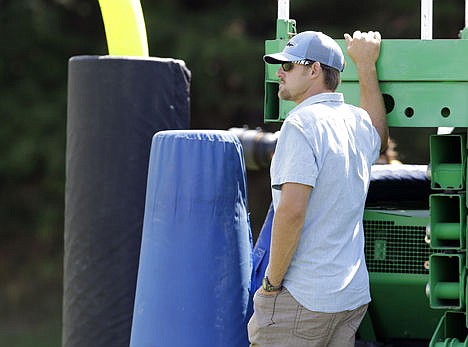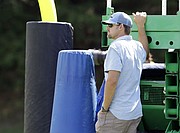Still Gross, but much lighter
SPARTANBURG, S.C. - Fans don't recognize him as often. Former teammates joked when they saw him at training camp. And his kids are excited that he can easily put on his seat belt.
Since playing his last game for the Carolina Panthers in January, Jordan Gross has shed 70 pounds, dropping from 305 to 235.
The Fruitland High grad is doing things he couldn't do during his NFL career, including slalom water skiing and trail running. He plans to compete in a duathlon Sunday morning at the U.S. National Whitewater Center in Charlotte.
Free from the carb-loaded diet he needed to maintain a weight suitable for life in the NFL, Gross, 34, is eating lighter and healthier, mixing up his exercise routine and weighing less than he has since high school.
"People can't fathom that you'd lose this much weight," he said. "I always told everybody, 'I can't wait till I'm done, I can lose weight.' Everybody says that. But it had to happen."
Gross, who was the Panthers' left tackle, retired from the NFL in February because 11 years of blocking the NFL's best pass-rushers had taken a toll on his body. Gross said he never had any serious head injuries, but was concerned the potential for chronic ankle pain would make it hard to enjoy an active lifestyle after football.
He had three surgeries on his right ankle during his career and believes the extra weight he lugged around for more than a decade contributed to his ankle issues.
Gross also knew there were risks in retirement. Players unable to maintain a healthy weight after retiring risk health problems such as high blood pressure, heart disease, diabetes, elevated cholesterol levels and an increased susceptibility to stress fractures and joint pain.
"I've seen guys hobbled up and heavy, or one or the other," Gross said. "And I sure thought if I can prevent that, that's what I wanted to do."
Bulking up
Keeping weight on was a constant struggle for Gross during his NFL playing days.
He was active growing up in Idaho. He hiked, snowboarded and spent a lot of time outdoors and participated in football, track and basketball for the Grizzlies.
Gross said at 15 he weighed 235 pounds. But he bulked up to 306 by his junior year at the University of Utah, where he was a consensus All-American and a finalist for the Outland Trophy, given annually to the nation's top interior lineman, as a senior in 2002.
Drafted by the Panthers in the first round in 2003, Gross started as a rookie at right tackle on the Panthers' only Super Bowl team. He moved to left tackle the following year, spending the next 10 years protecting the blind side of the Panthers' quarterbacks and earning three Pro Bowl berths.
To keep his weight up, he would gorge on pancakes when he'd cook breakfast for his two children. At dinnertime, he'd eat a large supreme pizza.
Staying at playing weight was especially hard during training camp in Spartanburg, when the pounds would melt off during the two-hour practices under the hot South Carolina sun.
About an hour before lights-out each night in their dorm room at Wofford College, Gross and teammate Ryan Kalil would make protein shakes packed with whey protein, carbohydrate powder and glutamine, an amino acid believed to help prevent muscle breakdown.
"It's not the best-tasting thing," Kalil said. "But you just chug it and move on."
Gross said he tried to eat lean meats and fruits during his playing career, but it was impossible to eat healthy and maintain the size he needed.
"If you're a guy like myself, or Kalil or some of the guys that are trying to be bigger, you literally can't follow the healthy eating guidelines because you need to get super, calorie-filled foods and saturated foods in your body because that's the only way to keep your weight up," Gross said. "So you have to ignore the nutritional guidelines just to be able to keep your weight."
The 'hog mollies'
NFL linemen have become super-sized over the past few decades.
In 1970, there was one player in the NFL who weighed 300 pounds or more, according to an Associated Press study. By 2011, 358 players were at least 300 pounds.
Panthers second-year general manager Dave Gettleman has an affinity for what he calls "hog mollies," big players who he believes are necessary to win in today's NFL.
The Panthers have two dozen 300-pounders on their 90-player training camp roster, including all 17 offensive linemen.
Kalil, the team's Pro Bowl center, arrived at camp last week at 302 pounds. He said he'll end the season in the low-290s.
"I can tell when I get lighter it's harder to anchor down. So there's some merit to being a certain weight," Kalil said. "The trick is to find out what a healthy weight is for you because you can go too far the other way."
An obesity specialist said even the heaviest NFL players don't face many health risks when they're playing because of their activity level. Problems occur when they keep eating high-calorie diets after they're done playing.
Peter LePort, director of the obesity center at Orange Coast (Calif.) Memorial Medical Center, said overweight former players run the risk of developing diabetes, high blood pressure, high cholesterol and heart disease. Many will need hip and knee replacements, LePort said.
The NFL has taken steps to help players maintain long-term health and fitness, providing resources through a player engagement group to assist current and former players on any health issue.
The current collective bargaining agreement requires teams to make a licensed nutritionist available to players.
Panthers head athletic trainer Ryan Vermillion said he plans to have Jennifer Brunelli, a registered dietician who works with the team, meet with players' wives and girlfriends to help them cook healthy at home.
Vermillion said many players want a break from physical activity after they leave the game.
"A lot of guys are just tired of working out. I've heard a lot of them say, 'I will never work out again. I will never lift again,'" Vermillion said. "And my recommendation always is, 'Don't say that. As hard as you worked to get into the NFL, that's how hard you'll have to work to lose the weight and maintain good health.'"
Dramatic change
Gross, now the sideline reporter for the Panthers' radio broadcasts, surprised his former teammates when he showed up at training camp last week having lost about a fourth of his playing weight.
Quarterback Cam Newton said Gross looked like a tight end. Kalil wondered whether Gross had lifted a weight since he retired.
Even Gross made fun of his new image. "My wife's freaking out," Gross said. "She says she's having an affair on me, with me."
His dramatic weight loss has prompted questions about whether Gross used steroids when he played - he says he didn't.
Gross didn't set out on a special diet to lose weight. He just started eating sensibly and exercising regularly, and the pounds began to fall off.
He doesn't have a personal trainer or work with a dietician. Much of what he's learned about nutrition he's gleaned from articles in Men's Health and Outside magazines.
Gross said he tries to avoid eating a lot of processed foods. "So I eat a lot of broccoli. I eat a lot of spinach. I eat a lot of avocados, salads and lean meat."
Gross tries to limit his intake of sugar, grains and saturated fats. But he allows himself to splurge.
He joined the Panthers' offensive linemen for pizza one night last week but made sure to eat a light lunch and run during the day. And instead of a whole supreme pizza, Gross had a few slices.
Gross has tried to vary his workouts. When he first stopped playing he exercised on an elliptical machine, joined a boxing fitness class and did CrossFit workouts. He slalom water skied this summer for the first time since high school.
Lately, Gross has been doing a lot of trail running while training for Sunday's duathlon at the Whitewater Center. About the time his ex-teammates take the practice field Sunday, Gross should have completed two 5-kilometer trail runs, sandwiched around a 2K flatwater paddle on the Catawba River. He's thinking of training for a triathlon.
He could have played another season or two in the NFL but wanted to get out with his body still mostly intact so he could enjoy his children and stay active.
"That's part of the reason I stopped playing. ... I probably could have eked out a couple more seasons," Gross said last week in Spartanburg. "But I just didn't want to have too big of a hit (health-wise) later in life at the other end."
Despite the good-natured jokes about his new-found abs, Gross said several current players have approached him to learn more about how he's done it.
"Everyone wants to know what diet are you on or what gym did you join? And I hope it lasts," Gross said. "It's up to me to make it last."



